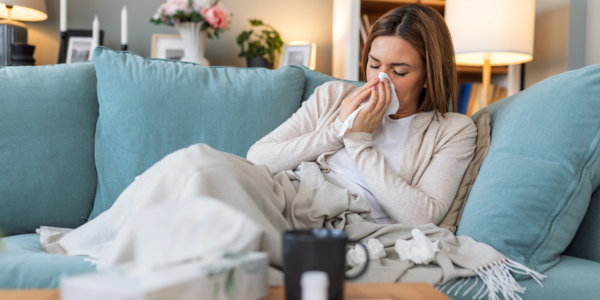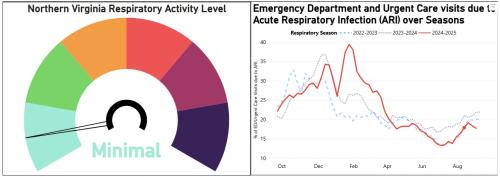
Note: This article has been updated with that latest information on COVID-19 vaccines.
Now that fall has arrived, flu season is here and the the number of people getting sick with a respiratory illness is expected to increase. Although germs will be prevalent for the next few months, there are still numerous ways to stay healthy and protect yourself from flu, COVID-19 and respiratory syncytial virus (RSV).
Respiratory Illness Dashboard
Our Health Department offers a dashboard that provides up-to-date information on respiratory illnesses in the Fairfax Health District. We use data from emergency departments and urgent care centers to track how many people are visiting these providers. These data help us see how respiratory illnesses are affecting our community over time.

Flu
Here are five simple strategies you can use to protect yourself and those around you from flu. Most of these suggestions also apply to avoiding other respiratory illnesses as well.
1. Get your annual flu shot
The flu vaccine is the best protection against the flu. It reduces your chance of getting sick and helps to protect others around you who cannot be vaccinated. Even if you do get sick, being vaccinated significantly reduces the severity of the illness. Everyone ages 6 months and older should get the annual flu shot. The ideal time to get a flu vaccine is September-October.
To find where you can receive a flu vaccine, visit VDH's Vaccine Provider Locator.
2. Wash your hands often
Washing your hands regularly is one of the best and simplest ways to prevent yourself from getting sick. Wash your hands with soap and warm water for at least 20 seconds. If there is no soap or water available, use an alcohol-based hand sanitizer.
3. Cover your coughs and sneezes
Coughing and sneezing can spread germs to others. Always cover coughs and sneezes with your elbow or a tissue, not with your hands. Make sure to throw out tissues and wash your hands immediately after.
4. Clean surfaces regularly and avoid touching your face
When you touch your eyes, nose and mouth germs on your hands can enter your body and make you sick. Clean frequently touched surfaces such as countertops, handrails and doorknobs regularly.
5. Stay home when sick
Staying home when sick is important in preventing illness from spreading to others. Stay home and away from others until at least 24 hours after both your symptoms are getting better overall, and you have not had a fever without using fever-reducing medication.
COVID-19
COVID-19 vaccines are available now, and they significantly lower the risk of getting sick, being hospitalized or dying from the virus.
People aged 6 months and older can receive the 2025-2026 COVID-19 vaccines based on individual-based decision-making with a healthcare provider. This includes pharmacists.
In Virginia, no prescription is needed for people aged 3 years and older to receive a COVID-19 vaccine at a pharmacy. However, not all pharmacies vaccinate children. Please call ahead or check the website of your local pharmacy to understand the age groups that they serve.
Health Department clinics have a limited vaccine supply and will only provide COVID-19 vaccine to individuals who are uninsured or covered by Medicaid.
RSV
RSV is a common respiratory virus that affects the lungs and breathing passages. It usually causes mild, cold-like symptoms and is very contagious.
The CDC has updated its recommendation for the use of RSV vaccines in people ages 50 and older. It now recommends the following groups get the RSV vaccine:
- Everyone ages 75 and older.
- People ages 50-74 who are at increased risk of severe RSV. For example, those with certain chronic medical conditions such as lung or heart disease, or those who live in nursing home.
This recommendation is for adults who did not get an RSV vaccine last year. The RSV vaccine is not currently an annual vaccine. Eligible adults can get an RSV vaccine at any time, but the best time to get vaccinated is in late summer and early fall before RSV usually starts to spread in communities.
More Information
For more information about respiratory illnesses, including symptoms of common viruses and other prevention techniques, visit the Health Department's webpage.
You can also help us by sharing resources with your community, such as flyers and videos.



 SIGN UP FOR DAILY EMAIL HEADLINES
SIGN UP FOR DAILY EMAIL HEADLINES